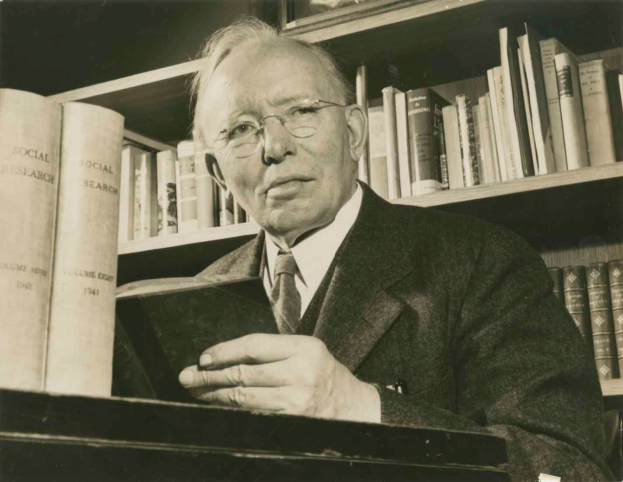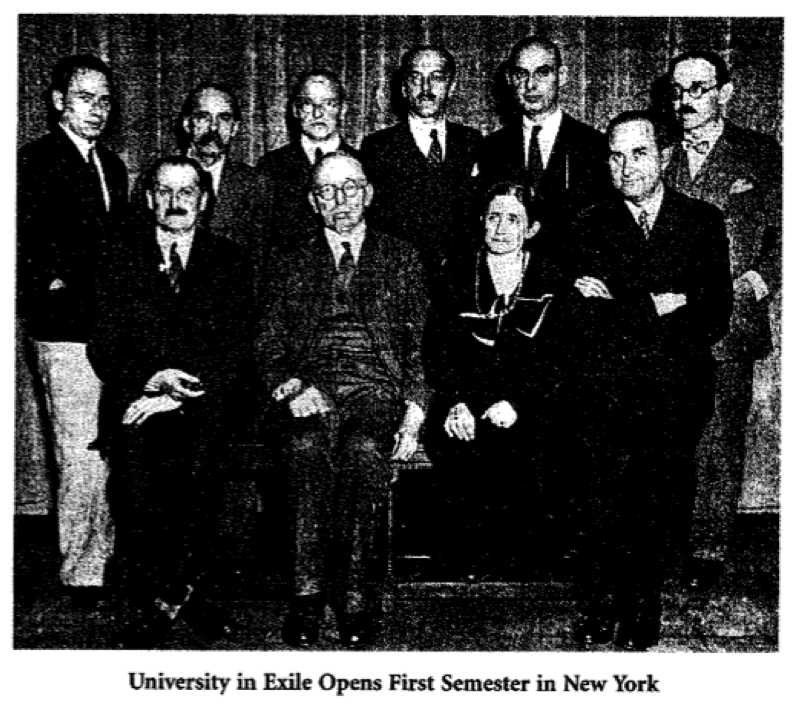by Student author from class on the History of The New School
Alvin Johnson was the president of the New York New School for Social Research when, in 1933, he responded with alacrity to the growing crisis in Europe. The previous year, Alvin Johnson had traveled to Europe and had witnessed a potential need for a haven for academics and scholars. Johnson had been in frequent correspondence with German-speaking Jewish scholars (especially economists) as a result of his work co-editing The Encyclopedia of the Social Sciences (1930-1935), to which many of these scholars had contributed entries. In addition, he had traveled to Germany in 1924, before his 1932 trip. These contacts, sustained over time through the Weimar era, made apparent to him the worsening political climate in Germany and the dangers they faced. Johnson initiated a program to provide refuge for endangered scholars, many of whom ended up at the New School.

In April 1933, Johnson began to raise $60,000 per year for two consecutive years. (Adjusted for inflation, that is equivalent to approximately $1,000,000 a year in 2013). This $120,000 was to support a faculty of 15 scholars, giving an annual salary of $4,000 per scholar. After only raising $10,000, Alvin Johnson received a donation of the whole $60,000 from Hiram J. Halle, a prominent Jewish industrialist and philanthropist, making all other donations additions to the cause. This allowed Johnson to begin immediately, and additional funding from the Rockefeller Foundation enabled him to enlarge his rescue efforts. By October, 1933, ten academics were brought to The New School and employed: the University in Exile began. By 1935, another six were added. And the name changed from the University in Exile to the Graduate Faculty of Political and Social Science.
The original members of the University in Exile included: the agricultural economist Karl Brandt, the public finance specialist Gerhard Colm, the economist and assessor of the Weimar’s Cartel Court Arthur Feiler, the economic theorist Eduard Heimann, the professor of jurisprudence and legal sociology Herman Kantorowicz, the economist and sociologist and first Dean Emil Lederer; the sociologist Hans Speier; the ethnologist and musicologist Erich von Hornbostel, the Czech-born founder of Gestalt psychology, Max Wertheimer, and the specialist in social policy Frieda Wunderlich.

Social research
In the foreword of the first issue of Social Research, Alvin Johnson defined the purpose of the new journal:
"Political revolution on the European continent had expelled from their usual orbits of activity scores and hundreds of the ablest scholars, to whom the scientific world had turned for light upon the problems that harass the whole of mankind. These scholars, representing collectively an important fraction of the world’s thinking power, had been divorced from their customary avenues of expression… Nothing could be more natural than the emergence of a new organ of publication at the New School, where the largest organic grouping of continental scholars abroad has been established as a Graduate Faculty of Political and Social Science."
The journal would publish writings from those at the New School primarily but would also include the works of others. The topics it covered would range from “theory, political, social and economic; problems of social and political organization that are worldwide in their general character though national in specific characteristics, such as class differentiation, militarism, the labor movement; problems involving the interdependence of nations, like the phenomena of prosperity and depression, prices and currency, movements of international trade and investment”, a list of issues that could still be relevant in the modern world.
The periodical still thrives today and can be accessed here.
For more in the New School Archives, see the Graduate Faculty catalogs, Hiram Halle home movies, and press clippings.